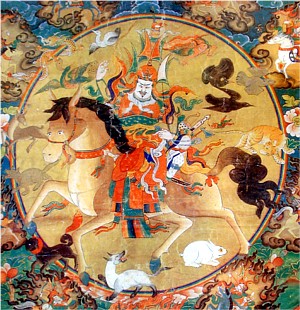Sollo Chenmo: Difference between revisions
Jump to navigation
Jump to search
No edit summary |
No edit summary |
||
| Line 1: | Line 1: | ||
[[Image:Gesar.jpg|frame|'''Gesar of Ling''']]'''Söllo<ref>The term söl (''gsol'') in Sollo Chenmo is very difficult to translate into English. When it occurs in practice texts it has at least three separate meanings: to encourage, to offer, and to tell or command. Here, it has the latter meaning in the Tibetan word ''gsol ka'', which is the equivalent of our ‘protectors’ practice’, but here it mainly has the sense of offering. This type of practice is called gsol mchod (translated here as invocation and offering), and it is the best known of all such practices related to Gesar, although the Fifth Dzogchen Rinpoche [[Thupten Chökyi Dorje]] (1872-1935) also composed a similar (and even longer) practice. | [[Image:Gesar.jpg|frame|'''Gesar of Ling''']]'''Söllo<ref>The term söl (''gsol'') in Sollo Chenmo is very difficult to translate into English. When it occurs in practice texts it has at least three separate meanings: to encourage, to offer, and to tell or command. Here, it has the latter meaning in the Tibetan word ''gsol ka'', which is the equivalent of our ‘protectors’ practice’, but here it mainly has the sense of offering. This type of practice is called gsol mchod (translated here as invocation and offering), and it is the best known of all such practices related to Gesar, although the Fifth Dzogchen Rinpoche [[Thupten Chökyi Dorje]] (1872-1935) also composed a similar (and even longer) practice. | ||
</ref> Chenmo''' ([[Wyl.]] ''gsol lo chen mo'') - A practice of invocation and offering to [[Gesar]] composed between 1877 and 1880 by [[Mipham Rinpoche]]. Its full title is 'The Swift Accomplishment of Enlightened Activity Through Invocation and Offering' (''gsol mchod phrin las myur 'grub'') | </ref> Chenmo''' ([[Wyl.]] ''gsol lo chen mo'') - A practice of invocation and offering to [[Gesar]] composed between 1877 and 1880 by [[Mipham Rinpoche]]. Its full title is 'The Swift Accomplishment of Enlightened Activity Through Invocation and Offering' (''gsol mchod phrin las myur 'grub''). In the practice Gesar is invoked, together with his retinue of [[drala]]s and [[werma]]s in various forms corresponding to the [[four kinds of activity]] and he is requested to carry out his activity and assist the practitioners. Note that the practice should only be recited on important occasions and not too frequently, because it is very powerful. | ||
==Commentary== | ==Commentary== | ||
Revision as of 12:56, 13 August 2008

Söllo[1] Chenmo (Wyl. gsol lo chen mo) - A practice of invocation and offering to Gesar composed between 1877 and 1880 by Mipham Rinpoche. Its full title is 'The Swift Accomplishment of Enlightened Activity Through Invocation and Offering' (gsol mchod phrin las myur 'grub). In the practice Gesar is invoked, together with his retinue of dralas and wermas in various forms corresponding to the four kinds of activity and he is requested to carry out his activity and assist the practitioners. Note that the practice should only be recited on important occasions and not too frequently, because it is very powerful.
Commentary
Orgyen Tobgyal Rinpoche says:
- "The practice of Sol Lo Chenmo was revealed as a gong ter, a ‘treasure of enlightened intent’, by Mipham Rinpoche. According to Dilgo Khyentse Rinpoche all of Mipham Rinpoche’s writings are gong ter. Söllo Chenmo is basically a practice of ‘entrusting activity’.
Notes
- ↑ The term söl (gsol) in Sollo Chenmo is very difficult to translate into English. When it occurs in practice texts it has at least three separate meanings: to encourage, to offer, and to tell or command. Here, it has the latter meaning in the Tibetan word gsol ka, which is the equivalent of our ‘protectors’ practice’, but here it mainly has the sense of offering. This type of practice is called gsol mchod (translated here as invocation and offering), and it is the best known of all such practices related to Gesar, although the Fifth Dzogchen Rinpoche Thupten Chökyi Dorje (1872-1935) also composed a similar (and even longer) practice.